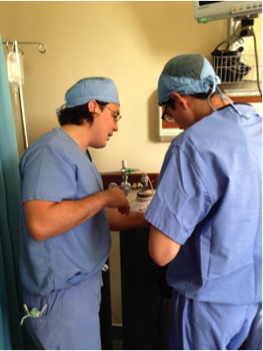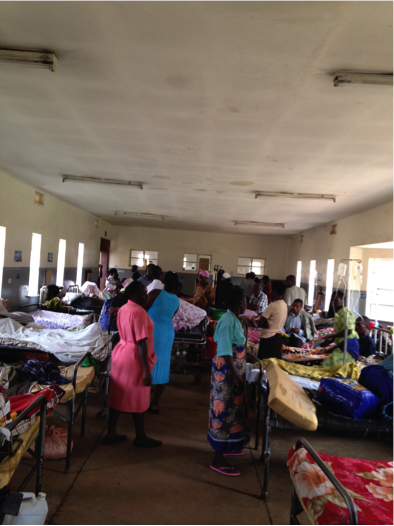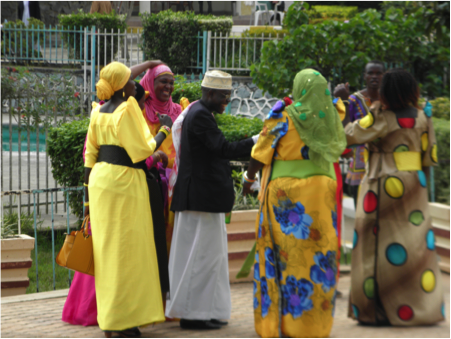For our first day on our own, team three hit the ground running, and without the guidance of team two it was time to step up. The team felt much more rested after a good night's sleep and nourished by a hardy breakfast. Except for me (Austin), due to unwittingly taking the fastest acting laxative known to medicine or lore, the Indian Chicken Palaka. Aside from my bothersome GI issues, we were firing on all cylinders today. We had a scheduled OR start time of 0800, but had assumed that the OR would be running on usual "African time" with a likely start time of 0930. This ,dear reader, was our first mistake. We arrived to the OR nurse stating flatly "You're late". Surprised and scrambling we got the morning rolling quickly from there. We put on our efficiency hats and divided up ---- Doctors St. Clair and Kip heading to the OR for a lumbar decompression with the assistance of Sheeron and Brian. For Eric, Joan and I it was time for rounds. These my friends were no ordinary rounds. Right from the get go we were hindered by basic equipment breakdowns, such as leaky oxygen tanks, which Eric MacGyvered . It was this kind of ingenuity that allowed us to make forward progress at all.
The conditions were unbelievable. It was clear the staff was trying to manage the patient load, but were running into overwhelming road blocks. The ICU had 3 of our patients such as Eric Agaba - our respiratory distress patient who was doing much better but taking no narcotics- after a massive two stage congenital scoliosis correction surgery. The patients' vitals and lab data required half an hour of searching and were only partially available. Overall, our ICU patients all seemed to be improving. We did multiple dressing changes and assessed our patients but there wasn't much we could do to minimize their pain beyond showing that we cared with a gentle touch and encouragement. The Ugandan staff as well as some of the patients live in fear of forming addiction to pain medications and are extremely reluctant to use them.
The conditions were unbelievable. It was clear the staff was trying to manage the patient load, but were running into overwhelming road blocks. The ICU had 3 of our patients such as Eric Agaba - our respiratory distress patient who was doing much better but taking no narcotics- after a massive two stage congenital scoliosis correction surgery. The patients' vitals and lab data required half an hour of searching and were only partially available. Overall, our ICU patients all seemed to be improving. We did multiple dressing changes and assessed our patients but there wasn't much we could do to minimize their pain beyond showing that we cared with a gentle touch and encouragement. The Ugandan staff as well as some of the patients live in fear of forming addiction to pain medications and are extremely reluctant to use them.
We finished up in the ICU and headed to the wards. This was like nothing I had ever experienced; the patients were packed into large open rooms with a male and female ward on either side of the building. The lighting was relatively non-existent and the insects were everywhere. The final component was the smell - even writing this I can't quite shake the odor - it was a mix of infection, excrement, blood, and severe body odor. Fortunately, even in this difficult situation there were definite rays of hope. Each patient had family surrounding them and doing their best to care for them. Our little girl Promise was out of the ICU today with improving function in her legs. We also saw 14 year old Mary with severe scoliosis. We couldn't believe this pretty little girl was 14. Because of her small stature, we thought she was somewhere between 6 and 8 years old. Mary is also an orphan and life has not been kind to her. Unfortunately, due to the severity of her deformity it can make her a target for bullying. We reassured Mary that we were going to do our best and We finished up rounds and met the rest of the team in the operating theater to get our supplies further organized and prepped for tomorrow. We also saw another patient randomly in the halls and reassured him that his mild neck pain was a normal part of having a cervical spine fusion. On our way out the door a nervous looking intern approach us and asked if Eric could glance at his knee. Eric agreed and saw that the patient a severe open patella fracture with bone sticking out of the skin, the intern wasn't sure if he should just put gauze on it and leave it. Eric quickly educated him on the nature of open fractures, as we left the wound was being irrigated, antibiotics were started, and we boarded him for surgery early next week.
After concluding our time at the hospital we headed back to the hotel where we witnessed a Ugandan wedding reception in progress. The women wore the most vibrant dresses I've ever seen and the air of festivity was a sharp counterpoint to our experiences in the wards. Dr. St Clair also regaled us with some of the details of the Ugandan wedding rituals over beers. Apparently, the groom gets "roasted" by a designated member of the bridal party - who tells all manner of insults to prompt the grooms family to bestow gifts upon him until he feels that the brides worth has been met. We all agreed that this was awesome tradition and would make for much more entertaining weddings stateside. We then climbed aboard the bus and were off to the Nakumattmbarara market - a clearing house of all random home goods that is reminiscent of a Target. Stocked up on water, coffee, and a couple bottles of spirits, we headed back to the hotel. At this point we were all fading and in need of catching up on our rest so back to the hotel we went.
After a brief siesta, we met again for dinner at the Rhino Restaurant at our hotel. Dr. St Clair led us in a Lieberman tradition of going around the table and discussing what we learned today. For me, the learning experience was an invaluable and overwhelming epiphany of how real it is for these destitute people. I had watched videos and read about how the terrible conditions are in Africa but seeing this first hand literally rendered me speechless. I wasn't sure what to do at first, part of me wanted to run, part of me wanted to cry and part of me wanted to just start hugging them. I have now had some time to digest what I saw, but what I realized is I will never empathize with their suffering. It is incomprehensible for me. I am so blessed and lucky enough to even have the opportunity to be here. I offer my help more as a symbolic token now because I could never truly alleviate their hurting, but we on team three will give it our best damn shot. For me, Eric, I also recognized just how much we take for granted in healthcare back in the US. Our team rounds were like nothing I've ever experienced, almost every encounter required obstacles to overcome and necessitated creativity and problem solving. For instance, availability of exam gloves, getting vital signs, or just communicating all required making do. The amazing thing was despite difficult conditions, the patients were grateful to be there and that gratitude couldn't help but elevate you. Recognizing this gratitude and using every mental as well physical resource to problem solve were invaluable lessons for today. After finishing our debriefing we enjoyed an epic meal of delicious local talpia and wine. And yes, my (Austin) stomach system held up and I am feeling both gastrointestinally comfortable and ready for sleep. We rounded out dinner and sleepily made our way upstairs to get ready for tomorrow.
After a brief siesta, we met again for dinner at the Rhino Restaurant at our hotel. Dr. St Clair led us in a Lieberman tradition of going around the table and discussing what we learned today. For me, the learning experience was an invaluable and overwhelming epiphany of how real it is for these destitute people. I had watched videos and read about how the terrible conditions are in Africa but seeing this first hand literally rendered me speechless. I wasn't sure what to do at first, part of me wanted to run, part of me wanted to cry and part of me wanted to just start hugging them. I have now had some time to digest what I saw, but what I realized is I will never empathize with their suffering. It is incomprehensible for me. I am so blessed and lucky enough to even have the opportunity to be here. I offer my help more as a symbolic token now because I could never truly alleviate their hurting, but we on team three will give it our best damn shot. For me, Eric, I also recognized just how much we take for granted in healthcare back in the US. Our team rounds were like nothing I've ever experienced, almost every encounter required obstacles to overcome and necessitated creativity and problem solving. For instance, availability of exam gloves, getting vital signs, or just communicating all required making do. The amazing thing was despite difficult conditions, the patients were grateful to be there and that gratitude couldn't help but elevate you. Recognizing this gratitude and using every mental as well physical resource to problem solve were invaluable lessons for today. After finishing our debriefing we enjoyed an epic meal of delicious local talpia and wine. And yes, my (Austin) stomach system held up and I am feeling both gastrointestinally comfortable and ready for sleep. We rounded out dinner and sleepily made our way upstairs to get ready for tomorrow.



 RSS Feed
RSS Feed
